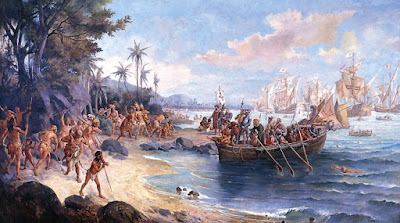 |
Landing of Pedro Álvares Cabral in Brazil, 1500.
|
 |
"Independence
or Death!" Declaration of Brazil's independence by Prince Pedro on 7 September 1822. His Guard of Honor greets him in
support while some discard blue and white armbands that represented loyalty to Portugal.
|
Portugal claimed the territory known as Brazil on April 22, 1500, when navigator Pedro Álvares Cabral arrived in a South American coast, today Brazil. Portuguese colonization began in earnest in 1534 and for the next 300 years to form the present borders of Brazil.
 |
Acclamation of King
Dom João VI of the United Kingdom of Portugal,
Brazil and the Algarves in Rio de Janeiro , 6 February 1818.
|
Napoleon invaded Portugal in 1808 for being an ally of the British, thus forcing the nobility of the Braganza family into exile in their Brazilian colony.
 |
Prince Pedro (right) orders Portuguese officer Jorge Avilez (left) to return to Portugal after his failed rebellion on
February 8, 1822. José Bonifácio (in civilian clothes) can be seen next to the prince.
|
The court of Portugal was established in Rio de Janeiro which became the official seat of the Portuguese empire. This settlement resulted in discord between the metropolis and the settlers.
 |
Prince Pedro is surrounded by a cheering crowd in São Paulo after giving the news of the Brazilian independence on 7
September 1822.
|
The Regent João VI who represented his incapacitated mother, Queen Maria I, rose Brazil to United Kingdom with Portugal, in December 1815. With the death of his mother, João VI was crowned on February 6, 1818. João VI transferred the capital of the United Kingdom of Portugal, Brazil and Algarves from Rio to Bahia, in Brazil.
 |
Coronation of Emperor Pedro I on December 1, 1822.
|
João VI returned to Portugal and left Pedro, his son, in Brazil, to rule the kingdom with the help of some ministers. He was then ordered to return to Europe, but Prince Pedro was supported by his wife Maria Leopoldina of Austria, just as well as Brazilian Liberals. Pedro replied that he would not leave Brazil and sacked the Portuguese generals.
 |
José
Bonifácio de Andrada e Silva, Brazilian politician and "Patriarch
of Independence"
|
Jose Bonifacio de Andrada e Silva, better known later as the "Patriarch of Independence" of Brazil supported Prince Pedro from the outset and advised him to break the dependence on the metropolis in Lisbon.
 |
Flag of the First Empire of Brazil, with 19 stars
representing the provincies by the time.
|
Finally, Britain and Portugal recognized the independence of Brazil on August 29, 1825.
No hay comentarios:
Publicar un comentario